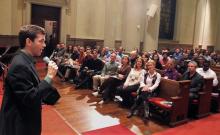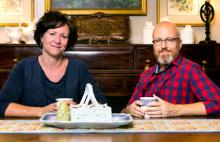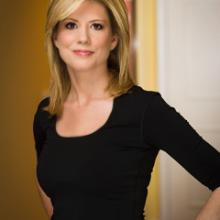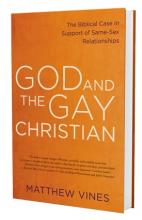Matthew Vines

Only a few dozen worshippers attend Boston’s Tremont Temple Baptist Church on a typical Sunday, but the historic church was once so prominent that legendary preacher Dwight L. Moody called it “America’s pulpit.”
This week, Tremont’s massive auditorium played host to influence once again when 1,300 Christian leaders gathered for the Q conference to discuss the most pressing issues facing their faith. There was no official theme, but one strand wove its way through multiple presentations and conversations: America’s — and many Christians’ — debate over sexuality.
While at least three other Christian conferences during the past year focused on same-sex debates, this is the only one to bring together both pro-gay speakers and those who oppose gay marriage and same-sex relationships.
“The aim of Q is to create space for learning and conversation, and we think the best way to do that is exposure,” said Q founder Gabe Lyons.
“These are conversations that most of America is having, and they are not going away.”
Which is not to say Lyons’ decision was without controversy.
Eric Teetsel, executive director of the Manhattan Declaration project that aims to rally resistance to same-sex marriage, urged Lyons to rescind his invitations to pro-gay panelists, whom he called false prophets professing to be Christians. Owen Strachan, president of the Council on Biblical Manhood and Womanhood, echoed the sentiment and tweeted that he was “shocked that @QIdeas features pro-‘gay-Christianity’ speakers.”
Lyons did not respond publicly to the criticism, but said such positions were rooted in fear.

Pastor Stan Mitchell’s announcement that his evangelical GracePointe Church would fully affirm gay members met with a standing ovation from some, stunned silence from others, but everybody prayed together quietly at the end of it.
A month and a half later, Mitchell routinely receives emails inviting him to kill himself, often including the assurance they were sent in love from other Christians. Half of his 12-member board has left, along with half the average offering and about a third of the weekly attendance — once at 800 to 1,000 people.
He’s met with dozens of disenchanted members and plans to see dozens more, apologizing almost compulsively for his handling of the issue. But there’s no going back, he says. He doesn’t even want to.
One of his biggest fears is that talking publicly about what happened at GracePointe could discourage countless other evangelical pastors who he says are ready to make the same move.
“I’m watching LGBT people finally make peace with themselves because they couldn’t get away from the authority of Scripture and what they thought it said about them,” said Mitchell, 46.
“The upsides — my God, they’re everywhere in this.”

On Feb. 21, Time.com broke the news that my evangelical publisher, Destiny Image, dropped a book contract it had made with me almost a year ago because its buyers refused to sell my book due to my pro-LGBTQ activism.
Many conservative evangelicals have called my pro-LGBTQ stance “deplorable” and labeled me a false teacher. Other progressives have uplifted my story as one that demonstrates the discrimination that too many conservative Christians have become known for. In all of this coverage, both positive and negative, though, the true message of my situation has gotten lost.
Sure, my publisher dropped my book contract. Sure, evangelical booksellers seem to have blacklisted me and refuse to sell my evangelical book in evangelical bookstores — a too-close-to-home example of the evangelical discrimination against the LGBTQ community and our allies.
But at the heart of this controversy, there’s a deeper problem: a fundamentally flawed belief that one cannot be a true Christian if one identifies as LGBTQ (or an ally of LGBTQ people).
EVANGELICAL CHRISTIANITY has changed significantly over the last 40 years on issues of gender, race, and nation. But until now it has not changed on homosexuality. Until the last five years, any self-identified evangelical Christian (in the United States, at least) suggesting that Christians might need to change some aspect of their teaching about same-sex-oriented people and their relationships has been (metaphorically, so far) banished by the evangelical community.
But that reality has begun to shift. Five books, all published in 2013-14, represent the newest wave of U.S. evangelical reflection on LGBT matters. Evangelical New Testament scholar James Brownson published Bible, Gender, Sexuality in February 2013. Vineyard pastor Ken Wilson unveiled A Letter to My Congregation in February 2014; Matthew Vines posted God and the Gay Christian last April; Wendy VanderWal-Gritter’s Generous Spaciousness came out in May; and evangelical Presbyterian Mark Achtemeier released The Bible’s Yes to Same-Sex Marriage in June. And my own Changing Our Mind came out in October.
Brownson’s work reveals that at least some of those who tackle questions about LGBT people and evangelical Christianity are scaling the great mountain of biblical scholarship and related literature on sexuality. In an early chapter he takes on in a broad way “traditionalist” Christian scholarship, notably in the work of Robert Gagnon, a mainline conservative at Pittsburgh Seminary. Gagnon’s primary claim is that the Bible’s consistent message about sex reveals a God-given design in creation (Genesis 1-2) involving physical/biological sexual complementarity between male and female. Gagnon argues that this creation theme underlies Paul’s condemnation in Romans 1:24-27 as well.

Matthew Vines took a leave of absence from his Harvard studies to explore what the Bible says about homosexuality. As a conservative evangelical Christian with a high view of scripture, Vines struggled to reconcile his identity as a gay man with the apparent teaching of the Bible. In his book God and the Gay Christian: The Biblical Case in Support of Same-Sex Relationships, Vines explains what he has learned about scripture and tells the story of his own pilgrimage of faith, fidelity, and family.
Read “My Dad’s Worst Day” (Sojourners, June 2014), an excerpt from Vine’s groundbreaking book. And be sure to watch this original SojoStory video, as Vines discusses his journey as a gay evangelical Christian who has immersed himself in seeking new and deeper understandings of what the Word has to say to us today on these profoundly important issues.
WATCH more below.

Some leaders use trending topics or hashtags to build momentum around a certain conversation. The idea is that by pointing followers to a catchy hashtag, activists can spark conversation and rally supporters around a cause. On Nov. 24, for example, Twitter lit up with the hashtag #PrayForFerguson after a grand jury decided not to indict a white police officer who fatally shot a black teenager.
One of the earlier noteworthy mobilizing campaigns included #KONY2012, a movement founded by a Christian, who launched a campaign to try to capture African Lord’s Resistance Army leader Joseph Kony. First Lady Michelle Obama famously participated in the #BringBackOurGirls campaign after more than 200 Nigerian schoolgirls were kidnapped by the terrorist group Boko Haram.
But everyone on Twitter is learning that a hashtag cuts both ways — it can be hijacked or lampooned by detractors, and it’s a key way that online activists are pushing back against opposing messages or what some might even call hate speech.

It used to be that defining an “evangelical” was pretty straightforward: some version of a “born-again” experience, a deep appreciation for the Bible as the written Word of God and a conviction to spread salvation to the masses.
Opposing homosexuality wasn’t part of that holy trinity, but for most evangelicals, it was more or less a given that all sexuality outside of man-woman marriage is sinful. Not so much anymore.
Growing cultural acceptance of homosexuality is leading many Christians to reconsider their historic opposition. As intractable as the debate itself can be, American evangelicals nonetheless are experiencing lively conflicts over maintaining boundaries. What can you believe about gays and still call yourself an evangelical? And who gets to decide?
In October, the Vatican’s Synod on the Family and a major conference of establishment evangelicals in Nashville both featured softer rhetoric on gays and lesbians while reaffirming the view that homosexuality is morally disordered.
Last week in Washington, however, a gay evangelical activist laid out a biblical argument for an affirming view.
Matthew Vines was raised in a conservative Presbyterian congregation in Wichita, Kan. Realizing and accepting that he was gay, Vines neither abandoned religion nor sought out a more affirming church. Instead, he delved deeply into the Bible and Christian teaching. He came away with the conviction that biblical Christianity could affirm same-sex relationships.

When Southern Baptists convened a national conference in Nashville, Tenn., this week to discuss issues of human sexuality, bringing conservative evangelicals and LGBT Christian activists into the same ballroom was a recipe ripe for potential fireworks.
Perhaps the most shocking thing was how few fireworks there were.
The Southern Baptist Convention’s Ethics and Religious Liberty Commission was clear: Sex is reserved between a man and a woman within the bonds in marriage. And openly gay evangelicals in attendance were equally clear: Homosexuality is not incompatible with Christianity.
No concessions were made, but leaders on both sides expressed surprise at how the two agreed to coexist. Put another way: The old emphasis on “Love the sinner, hate the sin” has become more a version of simply “Love all sinners. Ask questions later.”
“I do want to apologize to the gay and lesbian community on behalf of my community and me for not standing up against abuse and discrimination directed towards you. That was wrong and we need your forgiveness,” said North Carolina megachurch pastor J.D. Greear, drawing applause.
“We have to love our gay neighbor more than our position on sexual morality.”

When Julie Rodgers came out as a lesbian at age 17, her mom responded by taking her to an ex-gay ministry in Dallas. Rodgers had grown up in a nondenominational evangelical church where she assumed being gay wasn’t an option.
“With ex-gay ministries, it gave me the space to be honest about my sexuality,” said Rodgers, now 28. Yet that same honesty eventually led her away from ex-gay ministries.
Rodgers spent several years in Exodus, the now-defunct ex-gay ministry, before deciding she couldn’t become straight after trying to date men. Instead, she has chosen celibacy.
When Exodus shut down in 2013, some said it spelled the end of ex-gay ministries that encourage reparative or conversion therapy for gays to become straight. Ex-gay groups such as Restored Hope Network stepped in to the gap, but many religious leaders are now encouraging those with same-sex orientation or attraction to consider a life of celibacy.
For years, those who were gay or struggled with homosexuality felt like they had few good options: leave their faith, ignore their sexuality or try to change. But as groups like Exodus have become increasingly unpopular, Rodgers is among those who embrace a different model: celibate gay Christians, who seek to be true to both their sexuality and their faith.
Straddling one of America’s deepest cultural divides, Vanessa Vitiello Urquhart wrote in a recent piece for Slate that celibate gay Christians present a challenge to the tolerance of both their churches and the secular LGBT community. Those celibate gay Christians often find themselves trying to translate one side for the other.
But frequently, neither side really understands what it’s hearing.

Following the release of the popular God and the Gay Christian by Matthew Vines, and the innumerable responses by conservative pundits and theologians — including the cleverly titled e-book “God and the Gay Christian?” (Note the question mark. It’s very important.) — the church is discussing the morality of same-sex behavior as it never has before.
That’s really not saying that much, since the idea of homosexuality being anything other than a sin hadn’t been discussed within mainstream Christianity at all before this decade or so.
But still. The dialogue is cool to see. It’s much-needed, and has been for a very long time. I want to call the conversation “long overdue,” but that would be an absurd understatement, like saying a baby in the 403rd trimester is “a little late.”

Could there be a future where most American Christians support same-sex relationships? If so, it will be due to the emergence of conservative Christians who say orthodox believers can support lifelong, monogamous gay relationships without undermining their commitment to biblical authority.
In evangelical gay Christian Matthew Vines’ new book, God and the Gay Christian, he examines the six biblical passages on same-sex behavior and argues that they do not address today’s long-term gay relationships.
New Testament scholar James Brownson, who wrote the 2013 book Bible, Gender, Sexuality, concurs.

Matthew Vines has done us an incredible service by writing his book God and the Gay Christian: The Biblical Case in Support of Same-Sex Relationships. Matthew’s book is an articulate and engaging argument for Christians to support same-sex relationships. It is a great book and I highly recommend it to anyone interested in debate over Christianity and the support of same-sex relationships.
I appreciate this book for primarily two reasons. First, Matthew presents scholarship on the topic in a thoughtful way that won’t bore you to death. If you’ve already done your homework on the topic you probably won’t find anything new, but by reading this book you will encounter scholarly arguments in an engaging way. There are other books on the topic, of course, but what makes Matthew’s book different than most of them is that this is an engaging page turner.
Matthew skillfully debunks many of the arguments against same-sex marriage throughout the book and replaces them with arguments to support same-sex marriage. He not only takes a look at the biblical “clobber texts,” the six passages in the Bible often used to denounce same-sex relationships, but he also takes a look at the historical and cultural context of the ancient world’s view of sexuality. His argument is convincing. I encourage you to buy the book for yourself and for anyone you know who is open to hearing his side of the debate.